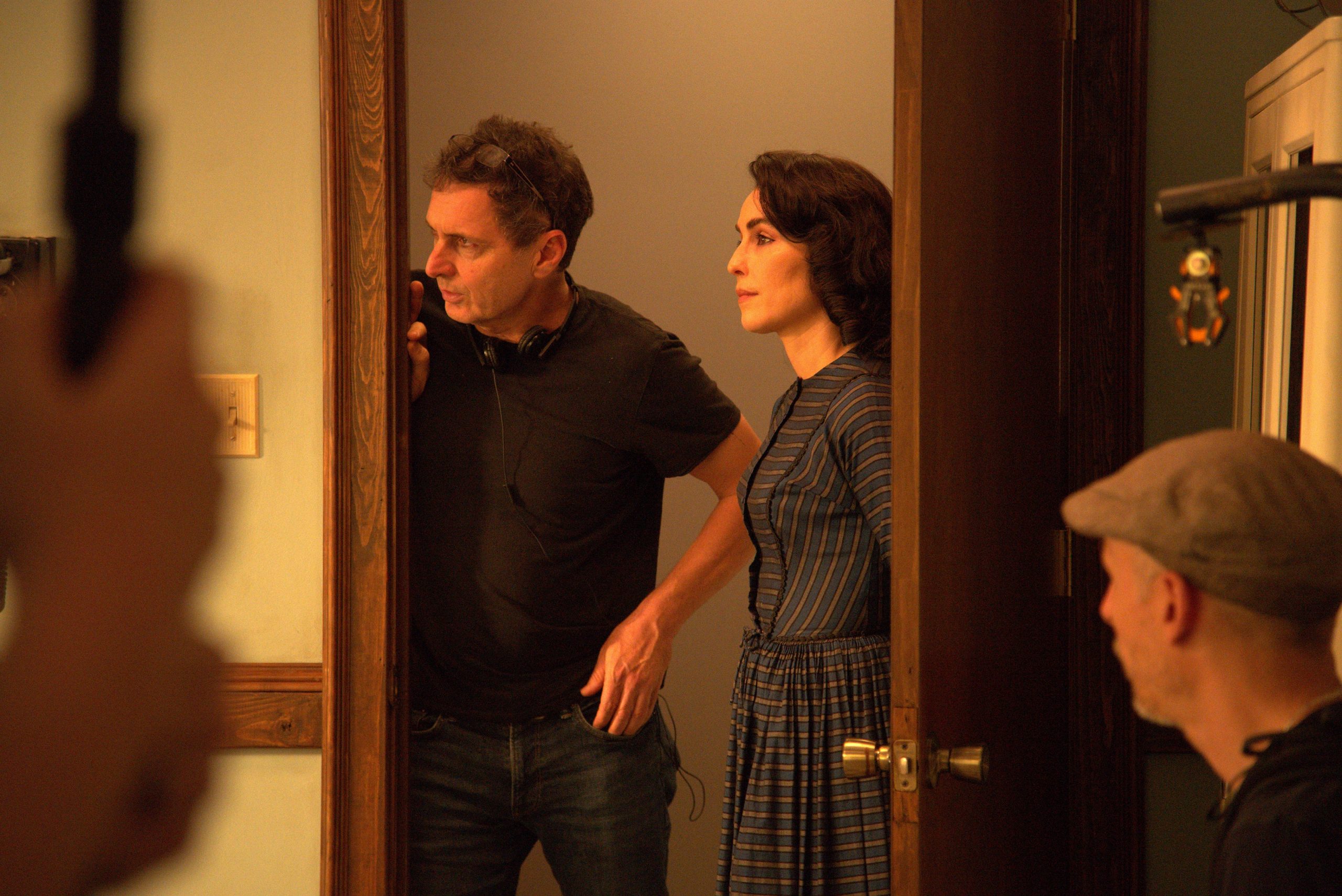
Yuval Adler spoke with Solzy at the Movies over the phone about his new thriller starring Noomi Rapace and Joel Kinnaman, The Secrets We Keep.
The Secrets We Keep opens in theaters on September 16 before going to VOD on October 16. How did you first learn about the project and what led you to sign on as a director and rewrite the script?
Yuval Adler: What made me sign on is Noomi and made me is quite literal. She literally took my hand and made me sign it. I heard about the project through Greg Shapiro, the producer who I knew through earlier, but Noomi is the one who saw Bethlehem and she decided that I should direct this film. Noomi was also a producer here and when she decides something, it’s impossible to say no to her. She was like a force of nature. She was just calling me to visit. I had just finished a film and I was kind of exhausted. She was in New York filming Jack Ryan and she came to my house—I’m in Brooklyn.
We sat and talked about what we are going to do to the script. We were completely in agreement about what needs to be done. It was just basically being from one film that I literally just finished starting this one where the production date is three months ahead or four months ahead because they had a window—her and Joel—where they can do the film. It was really going into a crazy schedule immediately but it was great. A lot of pressure sometimes is a good thing.
You suggested that Noomi Rapace’s character, Maja, be Romani because of her own background. What was the character before the changes were made?
Yuval Adler: It was Jewish Holocaust type stuff. Very Holocaust if you can say that.
There’s a lot of trauma involved here especially with sexual assault. How do you tackle those scenes a director?
Yuval Adler: I think the trauma is not just sexual assault. It’s more actually violence against your family and loved ones—sexual violence is part of it. We needed it to be graphic—some of her flashbacks and some of the stuff that we do show—because we wanted the audience to experience her kind of inner worlds. That’s the tools we have as filmmakers. We didn’t want it to be—there’s a borderline where it becomes kind of exploitation meaning it becomes that you’re kind of starting to enjoy the violence for violence sake. Not enjoy but do the violence in order to be more violent or in order to kind of just—I don’t know. There’s a line where it can become exploitive.
I don’t know how to explain it better but I just know that it even in the editing, we had a lot of discussions about it. How graphic we can be without feeling that we are actually exploiting these core effects like really think we need for the audience to experience from this in order to be in the mental headspace of the main character and that should always be what guides you. In terms of actually filming that stuff, you deal with great actors like Joel and Noomi, who had to do these scenes. Noomi had to go through a lot of difficult stuff throughout the film and also emotionally. When we did those scenes, it was much more physical, the stuff that she had to go through. These people are amazing—both of them. They’ve been making films for 20 years. You say action and they just go into places that it’s almost hard to believe.
What were some of the challenges that came with recreating the 1950s on screen?
Yuval Adler: Typically, the challenge with this is budget because we weren’t a big budget film. On the other hand, what I was surprised to learn is that not much more expensive. I thought that the cost of this would be much more than it was. It turns out—because in film, you have to dress the actors, create new wardrobe, and rent cars even if they’re contemporary cars. Here, we had to rent older cars or you have to build set anyways. It’s more about the budget issue—and it was here in this case—but it was more about this kind of fanatic attention to detail of the three principal creative partners on the film: Kolja Brandt (cinematographer), Nate Jones (production designer), and Christina Flannery (costume designer). We had to think how to create this period but also how not to be stuffy, how not to be—sometimes period pieces feel like watching them is like doing homework. It’s kind of too on the nose. Sometimes it’s hip and sometimes it’s not. We tried to give it a hip, poor modern look and not to feel like it’s stuffy. I don’t know how to explain it but it’s something that we actually saw. I could show you films that it’s, Oh, in this film, it’s so hip and cool and in this one, it’s so stuffy. I showed them the other films—the cool films as references.
What were some of those films?
Yuval Adler: My favorite period film for the period is The Untouchables—the Brian De Palma film—because it’s also so stylized. There’s something about the period there that it just doesn’t feel forced. It doesn’t feel like—I don’t know how to explain it.
What was the state of the film as far as post-production when the pandemic hit in March?
Yuval Adler: We were done. Luckily, we were done. I think January or February was the last that we did some effects, some color correction, and stuff like that. There was maybe one thing that we had to do, some titling or whatever. It was already done when people were at home. I remember that we were sending emails like, he’s already at home. He’s not coming to the office but he’ll do it from home and you just send him them files and people started stuff like that but at the very end, luckily.
How has the pandemic affected you as a filmmaker as far as being creative?
Yuval Adler: Because I’m also a writer, I managed to work like I almost—I don’t remember having comparable period in my life where I was so productive—I worked a lot. On the other hand, there is so much noise in terms of the discourse around the pandemic and around other stuff that kind of can drive you crazy if you don’t shut it out. It was a struggle to shut myself out of the world to certain extent so I can use the time for writing. And I did. I wrote another—literally, I started in April and I just finished the first draft of a script that’s one of the best things I’ve written if not I’m very, very happy with. It was good but of course, a lot of other things in the world drive me crazy. That’s the truth.
I feel like on a given day, it could be good or it could be bad. Who knows what ends up happening?
Yuval Adler: Exactly. I’m a very political person. I’m very opinionated. It’s hard for me to be disconnected. It’s hard to me not to have an opinion or argue about stuff and when stuff is wrong, and when people have false beliefs, which is now the state of the world around me to the degree I never knew in my life, for me not to engage is very hard in any way on social media or friends or whatever. I’ve made a conscious effort to engage less so I can actually do something.
You have an interesting background in your own right. How does someone with a doctorate choose to become a filmmaker?
Yuval Adler: Well, it’s not as easy as it sounds. It took me many years. When I finished my PhD, I was 29. I didn’t know anybody in film. One of the things I think that you get in film school, apart from film education—I think the main thing is that you know like-minded people. You have contacts, you are in a family of filmmakers. I didn’t have that. After finishing a PhD, which I was in academia for like 9-10 years, I was not going to go into another school. I didn’t go to school. I was like, That’s it—I’m not going to school anymore. I didn’t know that I can write. In the beginning, I didn’t think that I could write. I was looking for materials and I’m looking for opportunities to direct and I didn’t know how to do it. It was very difficult. Then I decided that I have to write. I had to teach myself to write and that was another process that took me a long time. I did many things in my life. I did mathematics, philosophy, and visual art. All the other stuff came to me very easy. Writing is the one thing that was very hard for me. I wrote a lot of shitty scripts and I made a lot of mistakes. I still am making mistakes. It’s funny because now I’m a writer. That’s my life. Typically, that’s most of my life. That’s what I do.



